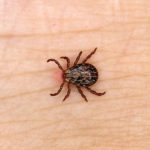By Bonnie Jenkins, Advanced Natural Wellness
What if I told you that there is a devastating illness that masquerades as multiple sclerosis, arthritis, and brain cancer? What if this disease could cause meningitis, congestive heart failure, depression, and a host of other psychiatric disorders? You’d probably think it was some rare condition that couldn’t possible affect you. But you’d be wrong.
This mystery disease is Lyme disease, which affects about 100,000 Americans every year. And summer is the prime season for it to rear its ugly head.
In the Lyme Light
Lyme disease is caused by the parasitic bacterium Borrelia burgdorferi. These bacteria are transmitted to people by the bite of infected ticks. The calling card of Lyme disease is most often a characteristic “bull’s-eye” rash accompanied by other symptoms including fever, melancholy, fatigue, headache, muscle aches, and joint pain.
Whether you remember having been bitten by a tick or not, it’s important to contact your doctor immediately if an unusual rash appears on your body. The incubation period from infection to the start of the telltale rash is usually seven to 14 days, but can be as short as three days or as long as 30 days. Some people who have been infected don’t show any symptoms or only develop nonspecific symptoms like a fever, headache, fatigue, or muscle pain.
If left untreated, Lyme disease can trigger neurological, cardiovascular, and arthritic symptoms. Characteristic signs often involve the peripheral nerves (all nerves except those in the brain, spinal cord, and optic nerves). Neurological problems associated with Lyme disease include numbness, pain, weakness, paralysis of facial muscles, visual disturbances, and meningitis with abnormalities that can include a fever, stiff neck, and severe headache. Eventually, the chronic malfunction of many peripheral nerves throughout the body can also develop, as can rheumatoid arthritis. This stage is usually marked by cognitive dysfunction, sleep disturbances, fatigue, and personality changes.
Open your arteries, improve blood flow for a new health miracle...
Did you know your circulatory system has over 60,000 miles of arteries, veins and other blood vessels, if stretched end to end?
But as you age, your blood vessels undergo changes, which may cause them to stiffen, thicken and get clogged.
GOOD NEWS! Doctors have now identified a “Miracle Molecule” inside your arteries that helps OPEN your arteries and IMPROVE blood flow.
It’s what Dr. Valentin Fuster calls it, "One of the most important discoveries in the history of cardiovascular medicine."To you, that means...
- Healthy blood pressure
- Sharper mind and memory
- Skyrocketing energy and muscular strength
- Increased pleasure and passion in the bedroom
- Improved circulation to every cell and organ in your body
Go here to discover a new natural way to significantly boost the levels of this miracle molecule in YOUR body NOW!
Get Tested
If this sounds like a difficult disease to diagnose, it is. Most people don’t even remember being bitten. And since ticks are often the size of a poppy seed, it’s easy to miss your encounter with one of these blood-suckers.
If you or your doctor think you have been bitten by a tick and you have any of the symptoms described, play it safe and get tested right away. The CDC recommends a sensitive test initially, either the ELISA or indirect fluorescent antibody (IFA) test, followed by the more specific Western blot test.
If you test positive for Lyme disease, your doctor will likely give you an antibiotic immediately – and you may need to take the drug for up to 30 days. Most experts agree that the sooner you start treatment, the better. The longer you wait, the less effective antibiotics will be.
Complementary Support
Are You Suffering From...
- Love handles and a pot belly
- Romance that isn't what it used to
- Forgetfulness and inattention
- Low (or no) strength and endurance
- A sex drive that's shifted into neutral...or worse
If so...you may have Mature Male Burnout. Click here to discover more about this unique condition and what you can do about it.
If you are given antibiotics, it’s important to take probiotics two hours after each antibiotic dose. Since antibiotics indiscriminately kill all the bacteria in your body, it’s critical that you replace the beneficial bacteria as soon as possible. These good bugs support a healthy immune response, which can help you fight the disease.
You can also ease some of the symptoms naturally by pairing your antibiotic with natural anti-inflammatories. Top of the list is fish oil. Taking 3,000 mg. of fish oil daily reduces inflammation and can help alleviate some of the joint pain that accompanies the disease. Cat’s claw – an herb from the Peruvian rainforest – can also calm inflammation and enhances immune function. Generally, most herbalists recommend taking 600 mg. daily to augment antiobiotics used for Lyme disease.
One Last Thing …
When it comes to ticks, prevention is key. Keep ticks away from your home by clearing away leaf litter and brush. Mow the lawn, keeping a wide pathway between areas that your family frequents and any surrounding woods or fields that are likely to harbor ticks.
When you encounter tick-friendly environments, wear long pants, long sleeves, and long socks. Tuck your pant legs into your socks, using tape around the socks for extra security. Wear light-colored clothing so you can easily see ticks crawling on your clothes.
It’s also smart to use an insect repellent. But don’t choose one that contains DEET, a toxic pesticide that may be harmful to humans. Opt for natural instead. These herbs and essential oils have been shown to be highly effective in keeping bugs – including ticks – at bay:
- Oils of citronella, clove, and lily of the valley possess repelling activities of the same magnitude as the repellent DEET against ticks.
- Rose geranium oil, a popular herbal tick repellent, contains geraniol, found to be more effective than DEET.
- An extract of garlic killed 100 percent of ticks within an hour, with effects lasting into the next day.
- Tea tree oil kills ticks and could be extremely useful in controlling them.
When you go inside, check your clothing carefully. Use extra scrutiny as you check ticks’ favorite spots – the scalp, behind the ears, the armpits and the groin area. Don’t forget to check your pets for ticks, as well.
Research Brief …
I recently heard from a reader named Nani who wanted a simple explanation of what it means if you have too much protein in your urine. It’s a common question – and it can be confusing if your doctor doesn’t give you an explanation.
Although healthy people do pass small amounts of protein in the urine normally, protein above a certain level suggests that there may be a problem with the filtering mechanism in the kidneys. When the kidneys are not functioning properly, some of the proteins they are supposed to keep inside of your body leak out, and come out in your urine. But, because it is difficult to make a good diagnosis based on just one urine sample, the doctor will schedule a second urine albumin test to double-check your protein levels.
People with high levels of protein in their urine are also often at high risk of diabetes and hypertension, or they have a family history of kidney disease. Until you get a definitive diagnosis, it’s probably wise to avoid taking any herbal supplements. I know that’s probably the last thing you thought you’d hear from me. But many beneficial herbs can actually irritate the kidneys if they are already compromised. Instead, adopt a healthy, antioxidant-rich diet that is low in sodium, potassium, and phosphorus. It’s also smart to take a multivitamin to ensure against any nutritional gaps.
The kidneys are remarkably resilient organs and can sometimes recover normal function if problems are diagnosed early. If you have healthy kidneys, protect them. The next time you see the doctor for your annual checkup, request tests for blood levels of creatinine and blood urea nitrogen, as well as urine levels of protein (albumin). Small elevations of creatinine can be an early sign of kidney disease. Early detection leads to early treatment which can occur at a stage when there is treatment to help prevent kidney disease from advancing to a more serious stage.
References:
Engelbrektson A, et al. Probiotics to minimize the disruption of faecal microbiota in healthy subjects undergoing antibiotic therapy. Journal of Medical Microbiology. 2009;58:663-670.
Hansmann Y. Treatment and Prevention of Lyme Disease. Current Problems in Dermatology. 2009;37:111-129.
Lyme Disease. Medline Plus. www.nlm.nih.gov/medlineplus/lymedisease.html
Thorsell W, et al. Repelling properties of some plant materials on the tick Ixodes ricinus L. Phytomedicine. 2006;13:132-134.






